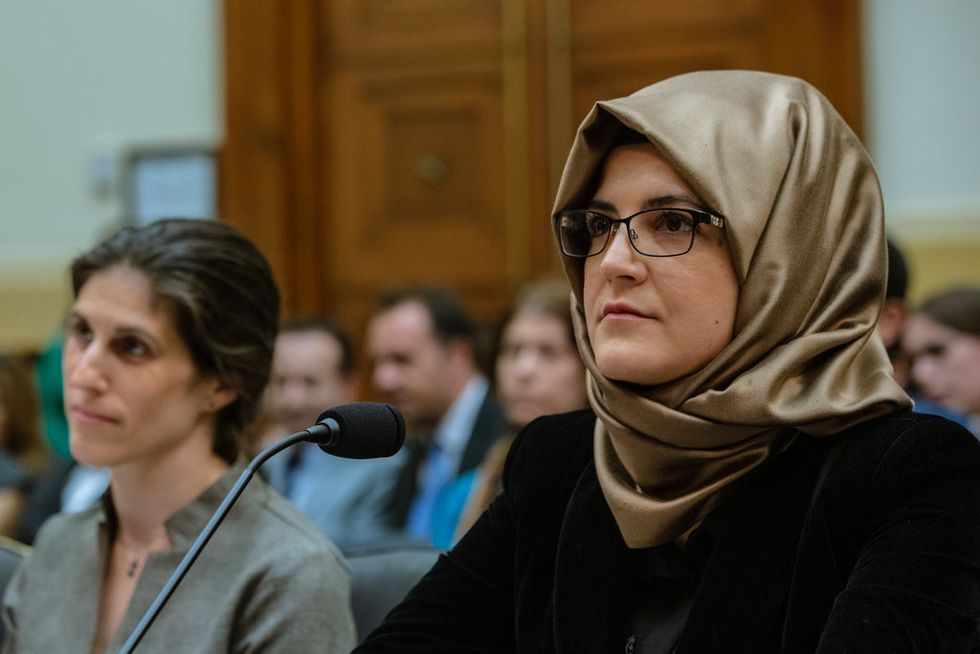Jamal Khashoggi Was My Fiancé. His Killers Are Roaming Free.
Washington hasn't done enough to bring the murdered Saudi columnist's killers to justice.
In May, I was invited to travel to Washington to attend some hearings at Congress. I had imagined the city in the words of my fiancé, Jamal Khashoggi. My visit left me with the troubling feeling that his memory was fading in the city he evoked so lovingly.
When I met Jamal in Istanbul, he had been living and working in Washington for more than a year, having left his home in Saudi Arabia amid a crackdown on intellectuals and activists.
As we got engaged and planned for our new life together in Washington, Jamal would speak with great warmth about the city, its museums and marketplaces. "Trust me, you will love it here," he would say. He would talk about his friends in the United States and speak about how he wanted me to meet them after our marriage.
Our dreams of a new life together brought him to Istanbul to get the required documents for our marriage from the Saudi consulate. He never walked out of that building, never returned to me and to the life we dreamed of.
Only eight months have passed. In the days before that fateful October afternoon, I was doing my bridal shopping. Jamal was curious. I would send him photos of everything I got and he would text back his comments. I look back at what happened. I realize how ordinary it was.
And then suddenly, Jamal was taken from us, in an unthinkable manner, something that could only happen in a horror movie. Yet that is the life I now live.
In Washington, I had the opportunity to talk with members of Congress. Every meeting made me understand how deep our loss was, how Jamal had commanded the love and respect of so many as a writer.

I was very moved when a congressman from Virginia, where Jamal lived, gave me a picture of them both. "We were together a month before it all happened," he said. "I still cannot believe it." He was as confused and sad as I am. I also met with some State Department officials, who told me that they had a productive meeting with Jamal a short while ago.
As I sat through these encounters, I began to feel that Jamal had not only died in Istanbul but also in Washington. A wave of rough emotions returned, as if I had lost him yesterday. We dreamed of living together in this town.
As I walked its streets alone and visited the museums and landmarks Jamal had told me about, I kept seeing his smiling face. I could hear the excitement in his voice as I walked across Washington without him.
But Washington hasn't done enough to bring Jamal's killers to justice. His loss was still fresh in the minds of the Democrats and Republicans I met. Individually, they all expressed their sympathies and spoke to me about how perhaps some progress might be made in the days ahead.
Yet I sensed that they also felt embarrassed: No solid action has been taken yet.
Washington has chosen not to use its strong ties and leverage with Riyadh to get the Saudis to reveal the truth about Jamal's murder and to ensure those responsible are held accountable. It made me sad to be there, to seek justice for Jamal in a place where he was so loved and respected.
My heart was doubly heavy because even after Jamal's murder and the global condemnation it inspired, Saudi Arabia has continued to commit atrocities. It reportedly plans to execute three imprisoned reformist scholars — Salman al-Awda, Awad al-Qarni and Ali al-Omari.
Jamal will never come back but something could be done to save these people, for whom he fought. President Trump has tried to look the other way. But he has the power to save the lives of the three men. Jamal always said they were reformists, contrary to allegations made against them by Saudi Arabia.
And Riyadh's lax attitude to the legal proceedings of Jamal's case cannot be accepted. I wonder what would he say to America about its silence and ambivalence toward his death? I still don't have the answers about the day he was taken from us.
On Wednesday, Agnes Callamard, a United Nations special rapporteur, released a meticulously detailed report aboutJamal's murder. She held Saudi Arabia responsible and called for an investigation into the role of the Saudi crown prince, Mohammed bin Salman. "There is credible evidence warranting further investigation of high-level Saudi officials' individual liability, including the crown prince's," she wrote.
Ms. Callamard also suggested the United Nations secretary general should establish an international criminal investigation to ensure accountability for the crime. I urge the United Nations to heed Ms. Callamard's call.
If Jamal and his principles have any humanitarian and moral worth, this is the time to speak up. To support the struggle for democracy in the Arab world, isn't it crucial to speak up against his violent death? If people of virtue don't stand up today for a man who defended such values and fought to advance them in his country, then who else is going to do it?
Hatice Cengiz was engaged to the Saudi columnist Jamal Khashoggi. This appeared in The New York Times.
June 19, 2019
###
June 20, 2019

